100+ Sports Interview Questions for Coaches: Essential Insights for Success
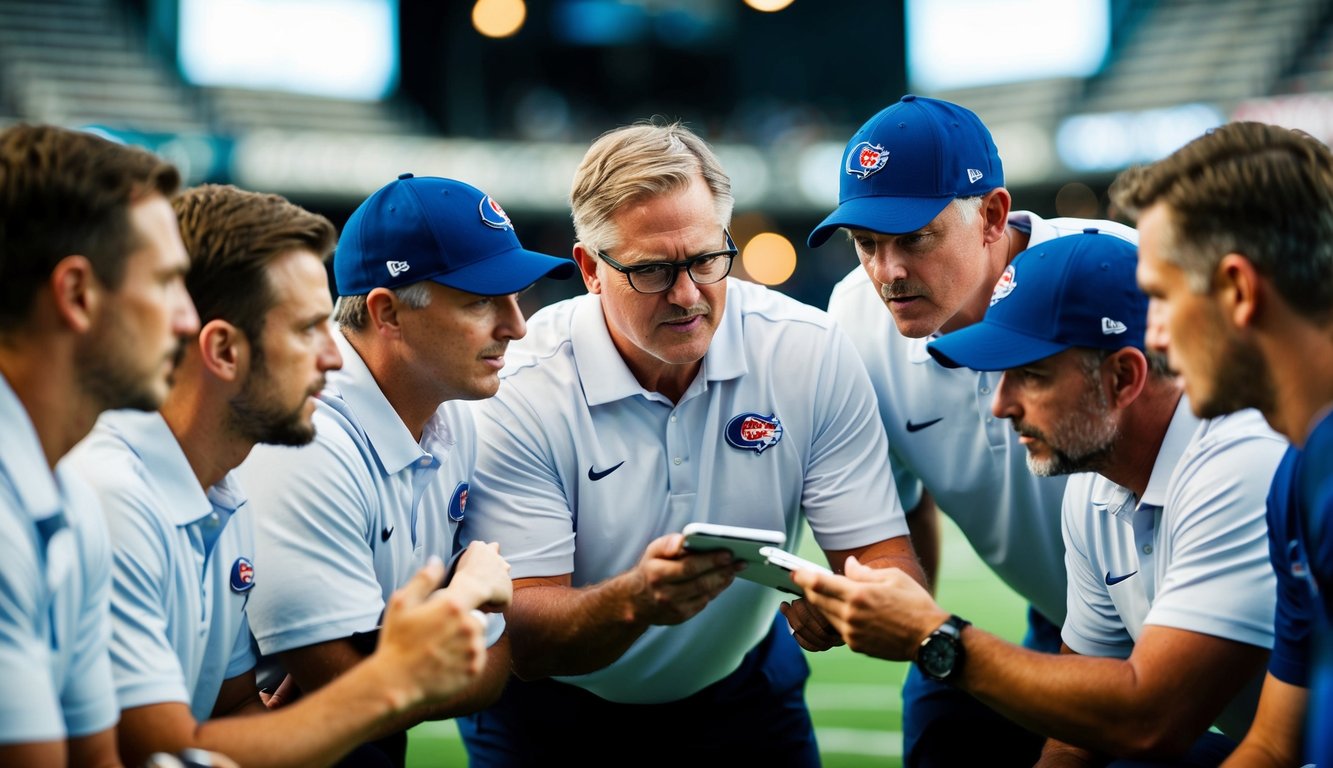
When preparing for a sports coach interview, asking the right questions can significantly impact your hiring decision. The questions you ask will help you uncover crucial insights about the candidate, ensuring you find the best coach to lead your team to success.
It’s essential to go beyond just understanding their coaching style. Dive deeper into how they manage challenges, motivate players, and navigate situations both on and off the field.
This approach will help you evaluate not only their technical skills but also their ability to inspire and lead effectively.
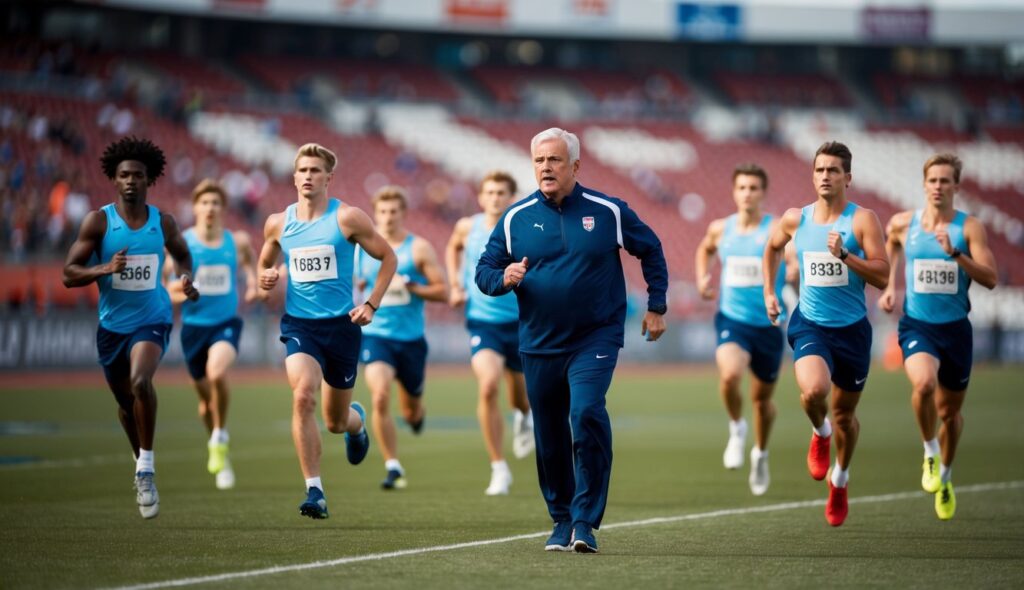
Ask about their coaching philosophy and how they develop new strategies for the team. This can give you insights into their adaptability and creativity. You might also want to ask how they motivate players and handle conflicts, as these skills are crucial for team success.
Don’t forget to discuss past experiences. Learning about challenges they’ve faced and victories they’ve achieved can reveal their strengths and weaknesses. By asking these key questions, you can better understand if a coach is the right fit for your team.
Understanding the Role of a Coach
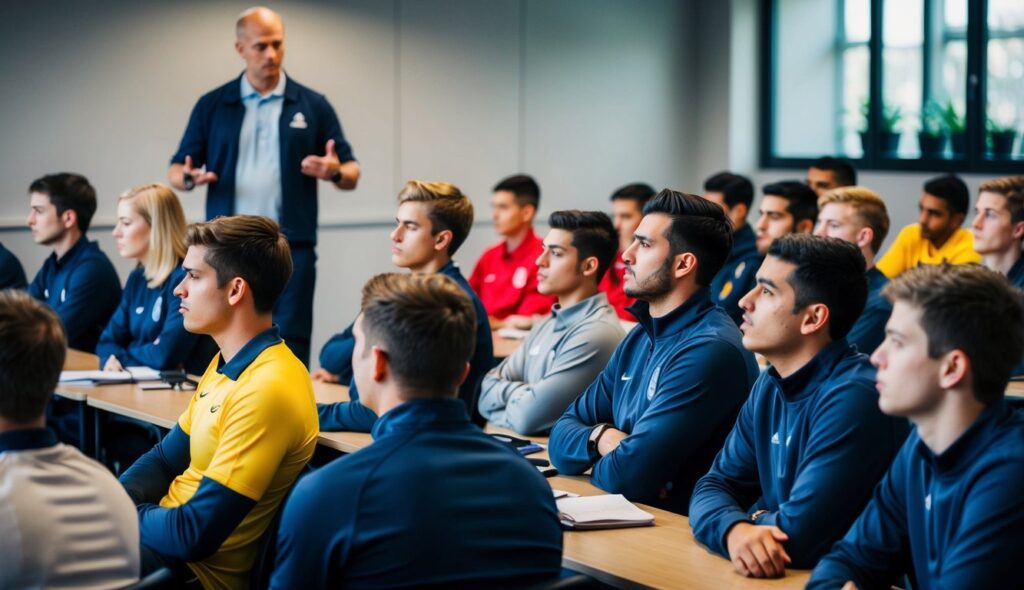
Coaches are vital to sports. They guide athletes, shape team strategies, and foster positive environments. The role includes managing teams, providing leadership, and ensuring that players continue to learn and improve.
Coach Position and Responsibilities
In the role as a coach, balance multiple tasks. The primary responsibility is to mentor and train athletes. This involves skill training, tactical planning, and performance assessment. Also focus on individual athletes’ growth to ensure each team member reaches their full potential.
Another crucial part of the job is to organize and conduct practice sessions. These sessions require careful planning to target different aspects like fitness, strategy, and skill development. Effective sessions contribute to team consistency and success.
Additionally, have the task of setting goals for the team. Goal setting helps to motivate players and provides benchmarks to track progress. The role of the Coach is to ensure athletes stay focused and committed to these goals throughout the season.
Leadership Qualities in Coaching
As a coach, leadership qualities are important. Communication skills are crucial for conveying instructions and feedback clearly. Open communication builds trust and a positive rapport within the team.
A Coach needs problem-solving skills. These help in making quick decisions during games and addressing team conflicts. Problem-solving fosters a stable and united team environment.
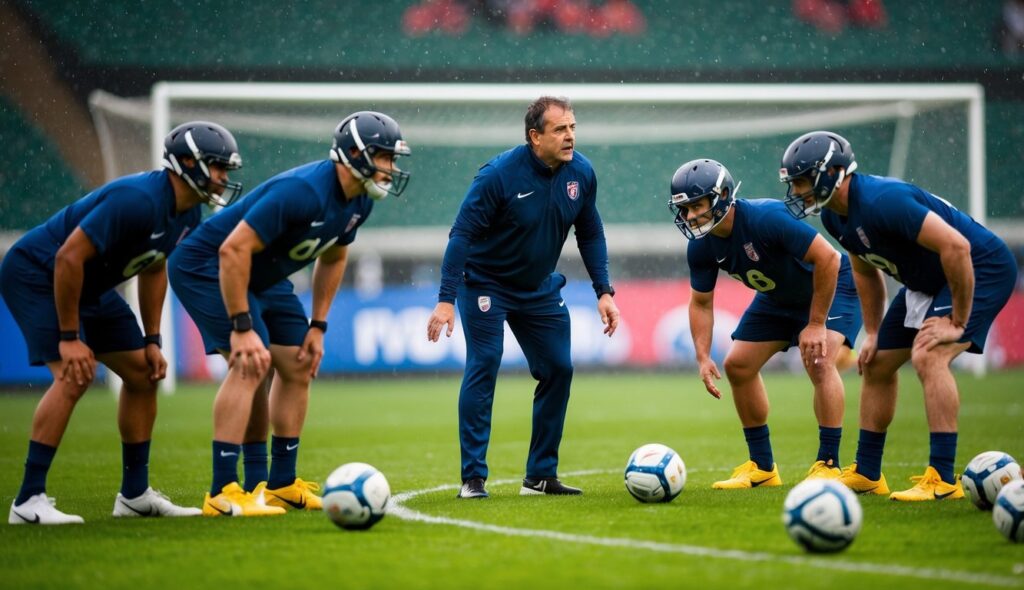
Adaptability is another key trait. He must adjust strategies and coaching techniques to meet the needs of different players and situations. Flexibility ensures that the team can handle various challenges.
Team Management and Development
In team management, focus on building a cohesive unit. He must understand the strengths and weaknesses of each team member. This involves close observation and sometimes requires personal discussions with players.
Also create team-building activities. These activities encourage cooperation and improve team spirit. A united team can tackle challenges more effectively.
A focus on player development is crucial. A track of each player’s progress and adjust training plans based on their development. Encouraging players to take part in professional development programs is also beneficial for long-term growth.
Training and Education Background
Having a solid foundation in training and education is essential. The coaching experience and educational background shape how you approach coaching. It’s important to stay updated with the latest coaching techniques and methods.
Pursuing certifications in sports coaching and related fields can enhance your skills. These programs provide knowledge about new coaching strategies and philosophies.
Continuous learning is a part of coaching. Participation in workshops, seminars, and courses keeps your skills sharp. This commitment ensures that can offer the best guidance to your team.
Coaching Techniques and Training Programs
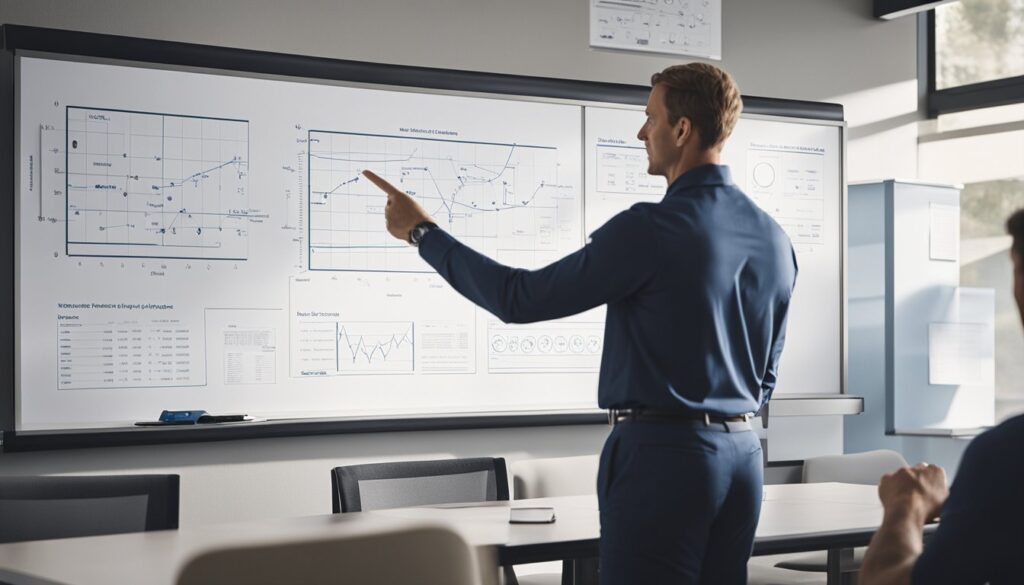
Coaches use a variety of strategies to develop athletes’ skills and prepare them for competition. This involves crafting tailored training plans, offering feedback to boost performance, building physical and mental strength, and ensuring a safe environment to prevent injuries.
Designing Training Regimens
Creating an effective training plan is crucial. The regimen should match the sport and the individual needs of athletes. Consider age, skill level, and goals. It’s important to mix different types of workouts—like cardio, strength, and flexibility. Planning rest days is also key to prevent overtraining.
Keep workouts varied to maintain interest. Documenting progress helps track improvements and adjust programs as needed. Engage athletes by setting clear, achievable goals.
Performance Analysis and Feedback
Analyzing performance provides valuable insights for improvement. Observing games or practice sessions allows you to identify strengths and weaknesses. Use video analysis tools to highlight specific moments.
After analysis, offer constructive feedback. Be clear and specific—focusing on positive reinforcement as well as areas for growth. Include athletes in the discussion to encourage self-reflection and collaboration on strategies for improvement. Follow up consistently to track progress.
Strength and Conditioning Focus
Strength and conditioning are key elements of most sports. Building muscle helps prevent injuries and improve performance.
Tailor strength workouts to fit the sport—like explosive exercises for sprinters or endurance training for long-distance runners.
Conditioning should improve energy systems relevant to the sport, enhancing stamina and recovery speed. Proper technique is crucial to avoid injury while training. Monitor fatigue and adjust intensity to ensure athletes remain in peak condition.
Mental Toughness and Stress Management
Mental toughness is as important as physical ability. Teach athletes how to handle pressure during competitions. Stress management techniques like deep breathing, visualization, and positive self-talk are useful tools. Encourage athletes to set mental goals alongside physical ones.
Role-playing challenging scenarios can help build resilience. Regular check-ins on athletes’ mental well-being ensure a balanced approach to training.
Injury Prevention Measures
Preventing injuries is crucial in training programs. Emphasize proper warm-ups and cool-downs for every session to prepare muscles and prevent strains.
Teach correct techniques to minimize the risk of injury. Use protective gear specific to the sport. Educate athletes on listening to their bodies and reporting pain early. Regular assessments help monitor any physical issues.
A focus on flexibility and balance can also aid in reducing injury risks.
List of 100 Sports Interview Questions for Coach

This list of questions helps coaches focus on improving skills, promoting fairness, balancing life, and developing players.
Continuous Improvement and Learning
- How do you stay updated with new coaching techniques?
Sample Answer: I read the latest sports journals and attend workshops regularly to learn about new techniques. - Can you describe specific goals for your coaching development?
Sample Answer: My goal is to enhance my understanding of sports psychology and improve athlete motivation. - How do you adapt to different learning styles in your team?
Sample Answer: I use a mix of visual aids, hands-on practice, and one-on-one discussions to cater to various learning preferences. - What tools do you use for self-assessment and improvement?
Sample Answer: I review game footage and seek feedback from peers. - How do you ensure your coaching methods are effective?
Sample Answer: I track player progress and adjust strategies based on performance data. - What is your approach to mentoring assistant coaches?
Sample Answer: I involve them in strategy sessions and provide constructive feedback. - Can you share an example of a failure that led to learning?
Sample Answer: After a tough season, I realized the need to focus more on team morale and adjusted my approach. - How do you incorporate new technologies in your coaching?
Sample Answer: I use analytics software to evaluate team performance and adjust training plans. - What challenges have you faced in continuous learning?
Sample Answer: Keeping up with rapidly changing technologies can be difficult, but I make time for regular updates. - How do you motivate yourself for personal development?
Sample Answer: Setting small, achievable milestones helps me stay focused and driven.
Additional Questions:
- How do you handle outdated coaching practices?
- What is your strategy for sharing new knowledge with your team?
- Can you identify areas for improvement in your coaching?
- How do you encourage feedback from players?
- What professional development resources do you use?
- How have your learning methods evolved?
- Can you elaborate on a recent coaching technique you adopted?
- How do you balance tradition with innovation in your coaching style?
- What role do peer reviews play in your growth?
- How do you assess the effectiveness of workshops or seminars?
Promoting Sportsmanship and Integrity
- What measures do you take to ensure fair play?
Answer: I make sure all players understand the rules and emphasize the importance of respect on and off the field. - How do you address unsportsmanlike behavior?
Answer: I talk to the player involved to understand the situation and work on behavior improvement. - How do you model ethical behavior for your team?
Answer: I lead by example, following rules strictly and treating everyone with fairness. - How do you handle conflicts among players to promote teamwork?
Answer: Open communication and mediation are key to resolving issues positively. - What is your strategy for teaching sportsmanship to younger athletes?
Answer: I integrate lessons on respect and integrity into everyday training sessions.
Additional Questions Sports Interview
- How do you encourage a positive attitude towards referees?
- What is your approach to dealing with biased officiating?
- How do you maintain a transparent team culture?
- How do you promote respect during competitions?
- How do you ensure inclusivity within your team?
- Can sportsmanship be taught, or is it innate?
- How do you reprimand cheating?
- How does honesty influence team success?
- What role does forgiveness play in sportsmanship?
- How do you celebrate victories modestly?
Balancing Coaching and Personal Life
- Q: What strategies do you use to manage time effectively?
Answer: I prioritize my tasks and set clear boundaries between coaching and personal life. - Q: How do you handle stress associated with coaching responsibilities?
Answer: Regular exercise and mindfulness practices help me manage stress effectively. - Q: What support systems do you rely on?
Answer: I lean on family and fellow coaches for guidance and support.
- How do you maintain work-life balance when coaching demands increase?
- What role does self-care play in your routine?
- How do you manage your schedule during peak season?
- What activities help you recharge?
- How do you handle coaching burnout?
- How does your personal life influence your coaching?
- How do you separate coaching from home life?
- What skills from coaching do you bring into personal life?
- How do you allocate time for personal hobbies?
- How do you plan vacations with a busy coaching calendar?
Encouraging Player Holistic Development
- Q: How do you support players’ personal growth beyond sports?
Answer: I encourage them to pursue academics and other interests for well-rounded development. - Q: What role does emotional intelligence play in your coaching?
Answer: Understanding players’ emotions helps in building stronger, empathetic relationships. - Q: How do you inspire players to set and achieve personal goals?
Answer: I help them set realistic targets and keep track of their progress for motivation.
- How do you encourage players to seek balance in life?
- What resources do you provide for mental health?
- How do you help players deal with failure?
- How important is character development in your training?
- How do you integrate life lessons in sports coaching?
- How do you measure a player’s holistic growth?
- How do you teach teamwork beyond the field?
- How do you foster resilience in your players?
- How do you adapt strategies for diverse player needs?
- How do parents play a role in holistic development?
List of Sports Interview Questions for Coaches (51-100)
- What is your approach to handling conflicts with parents?
- How do you keep players motivated after losses?
- How do you recognize player achievements?
- What is your feedback process for players?
- How do you manage players with special needs?
- What challenges have you faced with multi-sport athletes?
- How do you encourage teamwork among rivals on the same team?
- Do you involve players in strategy planning?
- How do you address substance abuse in sports?
- How do you handle disciplinary issues within the team?
- What impact does diversity have on team dynamics?
- How do you cater to introverted players?
- How do you handle public criticism of your coaching?
- What is your policy on social media for athletes?
- How do you ensure player safety in contact sports?
- What strategies do you use for player dispute resolution?
- How do you prepare players for post-sport careers?
- What are the signs of burnout in athletes?
- How does nutrition factor into your training?
- How do you motivate an underperforming team?
- What is your biggest challenge as a coach?
- How do you select your team captains?
- How do you keep training sessions engaging?
- How do you approach scouting for talent?
- What importance do you place on sports analytics?
- How do you handle pressure from sponsors?
- What role does community service play in your team?
- How do you foster friendship among players?
- How do you approach off-season training?
- What is your recruiting philosophy?
- How do you deal with personal loss affecting coaching duties?
- How do you approach player evaluations?
- What are your methods for conflict management?
- What plans do you have for continuing education?
- How do you handle media relations?
- What impact does technology have on your team management?
- How do you develop leadership qualities in players?
- How do you assist players with academic challenges?
- How do you ensure ethical practices in your team?
- How do you manage underfunded sports programs?
- How do you handle coaching criticism?
- How do you manage your team’s public image?
- How do you support injured athletes?
- What is your policy on substitutions and player time?
- How do you respond to negative feedback from players?
- How do you encourage a growth mindset in athletes?
- How do you build trust with parents?
- How do you deal with team politics?
- How do you address cultural differences in your team?
- How do you promote lifelong fitness in players?
Also Check: 100+ Sports Interview Questions: Expert Tips for Engaging Athletes
Frequently Asked Questions for Coaches

Coaches often face challenges that require them to keep their teams focused, manage different skill levels, maintain discipline, and stay motivated. Gathering and using feedback effectively is also crucial.
What are your methods for ensuring that the team remains focused and cohesive during high-pressure situations?
Coach can implement routines and drills that foster trust and communication. Set clear goals for each game. Encourage team members to support each other. Use practices to simulate high-pressure scenarios.
How do you assess and handle varying skill levels within your team?
Coach can evaluate players through regular assessments during practice sessions. Use drills to identify strengths and weaknesses. Provide additional support or training where needed to bring everyone to a more consistent level.
Can you describe your philosophy and approach towards team discipline?
Trainer should create a clear set of rules and expectations. Consistency is key in enforcing these rules. Allow room for mistakes, but focus on corrective actions and learning rather than just punishment.
What strategies do you use to motivate a team facing consistent losses?
Focus on small wins and improvements during practice. Reinforce the importance of effort and teamwork. Help players see losses as opportunities for growth. Boost morale by acknowledging hard work and progress.
In what ways do you incorporate feedback from your assistants and players into your coaching strategy?
Regularly scheduled meetings with the team and assistants can be productive. Be open to suggestions and new ideas. Implement a feedback loop where everyone feels heard. Adapt strategies based on constructive criticism to improve team performance.
All the Best !






